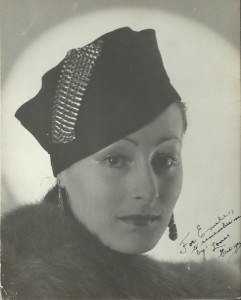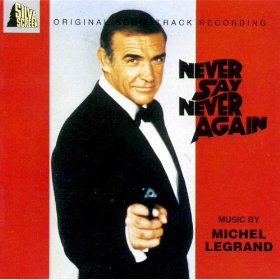Glad-Eyes
Theme Songs Page | Previous Theme Song | Next Theme Song
Glad-Eyes
Main Title – Never Say Never Again, Music by Michel Legrand, Lyrics by Alan and Marilyn Bergman, Sung by Lani Hall, Trumpet Solo by Herb Alpert (1983), encountered 1984
Buy it here | See it here | Lyrics here
Since I was newly single in the summer of 1984, you might have expected to see the odd woman around my apartment at that point. You probably would not have expected to see this one, however. My Aunt Gladys, then 70 hard years old, was a frequent visitor, and for a time she assumed a surprising role in my life.
 You can see her in this photo taken the Christmas of the following year, in ill-assorted thrift-store clothes she chose (no doubt) for their garishness, which cannot conceal the absence of teeth, and the stringy gray hair, and it may be hard to conceive that she was once a great beauty and a Hollywood starlet. And yet I have ample photographic proof of the beauty part, a sample of which is here too.
You can see her in this photo taken the Christmas of the following year, in ill-assorted thrift-store clothes she chose (no doubt) for their garishness, which cannot conceal the absence of teeth, and the stringy gray hair, and it may be hard to conceive that she was once a great beauty and a Hollywood starlet. And yet I have ample photographic proof of the beauty part, a sample of which is here too.  And somewhere I have a still from some forgotten Hollywood picture, a large cast with Gladys off to one side, clearly not the star. But the point is, she was in the picture. Her parents, whose boys went to Harvard and Princeton, had to watch as she eschewed even acting lessons and ran off to Hollywood, maniacally assured of her future. And to her credit she made it some distance. She was in the picture. But alas, not in pictures for long. She married an actor of some note, Ted Hecht, and then a New York photographer, and in her own mind she was still a great actress and a philanthropist.
And somewhere I have a still from some forgotten Hollywood picture, a large cast with Gladys off to one side, clearly not the star. But the point is, she was in the picture. Her parents, whose boys went to Harvard and Princeton, had to watch as she eschewed even acting lessons and ran off to Hollywood, maniacally assured of her future. And to her credit she made it some distance. She was in the picture. But alas, not in pictures for long. She married an actor of some note, Ted Hecht, and then a New York photographer, and in her own mind she was still a great actress and a philanthropist.
In her mind.
Bipolar
The story of Gladys was the story of her mind; she was a victim of what we now call bipolar disease, in those days known as manic depression. Her family had watched in despair as her mind had driven her life out of control. When her parents died, she occupied their Central Park West apartment for a while, then lost that, as she ricocheted from psychiatric wards to the street or a shabby apartment and then back into psychiatric wards again.
Eventually she had quarreled with or driven away everyone in the family, except me. She was isolated. And as I have recounted, in my own way, in the summer of 1984 I was isolated as well. Up until that point I had pulled the same evasive maneuvers in dealing with her that most of the rest of the family did. Now, I stopped, or, if not stopped (some boundaries had to be maintained), I made sparing use of them. And I shall always be glad that I did.
A New Metier
One thing that Gladys may not have had much experience in doing was caring for anyone else. Mostly other people’s lives were at least adequate compared to hers, and hers was so lacking and contact with her so alarming that people instinctively pulled away, ended brief get-togethers with a My, how late it’s getting!, and kicked her out or made their escape; they certainly didn’t invite her deep enough into their lives for the question of them being helped by her ever to arise. But in the summer of 1984, I needed care, and for a little while, she found her metier in providing it.
It wouldn’t have worked if she hadn’t been in a depressed phase. Gladys manic could be unbearable. But she was in a lengthy depressed phase.
Order from Chaos
I had a pretty large apartment. I needed to unpack things. I needed to clean things up. And Gladys pitched in. She came over and we spent, I think, two or three afternoons getting the place shipshape. She wasn’t much interested in hearing my tales of woe; there was only room for one narrative in her mind, and it wasn’t mine. But she did enjoy being with me and she really was a help in getting the place organized.
It was strange that someone who could generate such chaos in any space she occupied could somehow help bring order to mine. But she did.
The song I associate with our times together that summer is the theme to the non-canonical[1] James Bond sequel, Never Say Never Again. Why on earth? Well, long story short:
The movie had come out in 1983, the same year as the dreary canonical Octopussy. Never Say Never, featuring the original Bond, an older but still sexy and dangerous Sean Connery, a smart and funny screenplay by Lorenzo Semple, Jr., who had brought the Batman television series to me in my golden youth, and a Michel Legrand score, was just infinitely superior. And in those days you had to wait about a year for the home video (VHS videotape) to come out. I couldn’t afford much in the way of creature comforts over and above the apartment itself, but I was going to have a VHS tape deck, come hell or high water. And one of the first movies I rented to play in that deck was the then-just-released Never Say Never Again, which I was eagerly awaiting a chance to re-view.
I wanted it so much that, when Gladys and I decided to rest from our labors, I asked her if she’d like to watch, as it just so happened that that cassette was on rental in my apartment that afternoon.
Old Hollywood Meets New
Now, Gladys may have been a creature of the old Hollywood, but when I say that I mean really old, Sunset Boulevard old. Her exposure to popular culture had mostly ended before I was born. She might just have heard of James Bond, but she certainly wouldn’t have known anything about him. So I had no idea what her take on the ultimate celluloid hero would be.
Her introduction to 007 turned out to be fascinating to watch. She was dumbfounded. She wasn’t given to expressions like “Well, I never …” but she repeatedly muttered similar sentiments, though I can’t call the words to mind. Obviously she didn’t understand most of what was going on onscreen, but it really didn’t matter to her, because the whole thing was so unbelievable it was comic (even more than the tongue-in-cheek script had attempted). The bottom line was, Gladys had a wonderful time.
That was a high point for me: in the midst of my chaotic summer of separation, I and my crazy aunt finding a fragile, temporary point of equilibrium, a moment in which she was doing for me what a normal kind aunt would do and I was repaying her with a treat she enjoyed, as the nephew of a normal aunt would do.
And of course the number that came from the movie to stay in my head was Lani Hall’s wonderfully-rendered theme song with, as an added bonus, a soaring trumpet solo by her husband, Herb Alpert.[2] I had been in love with Lani’s voice since her days with Brasil ’66 (they account for another of these Theme Songs, you’ll recall). For many years I felt this was the single best Bond song, although I now think k.d. lang’s Surrender (the end title music from Tomorrow Never Dies (1997)) surpasses it.[3] Best or second-best, it’s a really great song, and reminds me of that summer and my afternoons with Gladys.
As you might expect for someone who lived so hard a life, Gladys did not make it to age 80. There wasn’t much gladness about her in the end, despite her self-appointed nickname of Glad-Eyes. My wife, who made her acquaintance a little later, has written feelingly about those difficult years that lay just ahead for her, and us in our relationship with her. But in the summer of 1984 there was a strange moment of ease, and when I hear that song, I remember it.
[1]. For those who aren’t already fanboys like me (to whom this is elementary stuff) the Saltzman/Broccoli/Wilson productions are the authorized James Bond movies, the history of which goes back to 1962. Owing to the tangled publishing history of the underlying Ian Fleming books, there were two novels the rights to which had fallen into other hands. In the case of Never Say Never, it might be more accurate to say “additional hands.” Thunderball (1965) and Never Say Never both are movies of the same book. Or perhaps more accurately (the matter was disputed) the novel and Never Say Never are both based on the same original screenplay.
[2]. Another fanboy note: Alpert was also prominently featured in the title music for the only other non-canonical Bond, 1967′s spoofy Casino Royale (the canonical version of which emerged in 2006).
[3]. The ultimate Bond song must be sung by a woman, and it must be swoony in some way. That’s why Goldfinger loses out, no matter how fabulous it is.
Copyright (c) Jack L. B. Gohn, except for cover art

Thanks for sharing such a great story Jack!